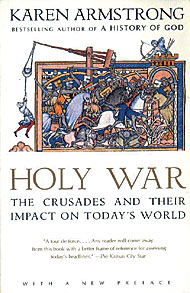Karen Armstrong, one of the world’s foremost scholars on religious affairs, recently held several meetings in Cairo. Before a packed auditorium, she spoke about the future of Islam in the West, a subject she knows well, having written extensively on it. She has published, to name only a few books, “Holy War: The Crusades and Their Impact on Today’s World,” “Islam: A Short History,” “A History of God: The 4000-Year Quest of Judaism, Christianity, and Islam.”
Armstrong admitted very frankly right at the beginning of the meetings that the world was in a mess and she subsequently tried to explain what she believed had led to the mess. She called the “clash of civilization” “an infamous phrase” and said she preferred to say the “clash between civilizations” which she sees as the next stage of colonization.
“There seems to be something intrinsic in civilizations which sets them against each other. We are all confronted by frightful images - the beheading of hostages in Iraq, the bulldozing of Palestinian homes, the prisoners in Guantanamo Bay, the bombing of Al- Jazeerah and the constant representation of Islam as a religion of the sword.”
In her book, “Holy War: The Crusades and Their Impact on Today’s World,” Karen Armstrong states that to refer to Islam as a religion of the sword is inaccurate; it is “one of the prejudices we have inherited from the period of the Crusades. It is just one example of the distorted picture that many people in the West have of Islam ...The crusades made the hatred of Jews an incurable disease in Europe, and Islam would henceforth be seen as the irreconcilable enemy of Western civilization...Crusading is not a lost medieval tradition: it has survived in different forms in both Europe and the United States and we must accept that our own views are as likely to be as blinkered and prejudiced as those of the Arabs or the Jews.”
Armstrong also explained the big divide between the United States and Europe: “The Americans saw the war (in Iraq) as fixing something but Europe knew that was not true. Wars leave stigma and wars infect us. Some people in the United States ignore who the Palestinians are. Americans know more about religion than politics. The US is the most religious country in the world whereas Europe is becoming more secular. In the U.K. only 6% of the population are regular worshippers whereas in the United States 80% of the people regularly attend religious services. The West needs to be deconstructed.”
Few would deny that since 9/11, the world has changed and Armstrong feels: “We need a new concept of civilization.” She said that she was asked to join the Alliance of Civilizations, a UN initiative whose first conference was recently held in Spain. This new entity aims to encourage deeper studies: “Islam can make terrific contributions. We don’t know each other anymore. We are getting false images. We need a constant dialogue between Muslims.”
She herself acknowledged that she wrote a biography of the Prophet Muhammad (pbuh) in order to create a better understanding. She also told the audience that after 9/11, Americans exhibited an incredible interest in Islam which was certainly “a favorable development.”
In “Islam : A Short History,” Armstrong concluded: “The West has not been wholly responsible for the extreme forms of Islam, which have cultivated a violence that violates the most sacred canons of religion. But the West has certainly contributed to this development and, to assuage the fear and despair that lies at the root of all fundamentalist vision, should cultivate a more accurate appreciation of Islam.”










